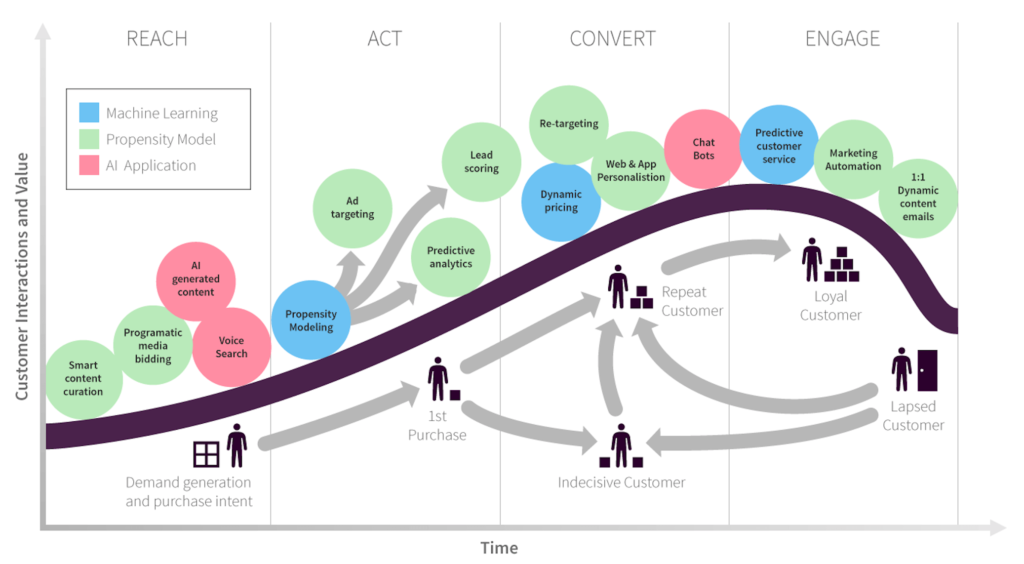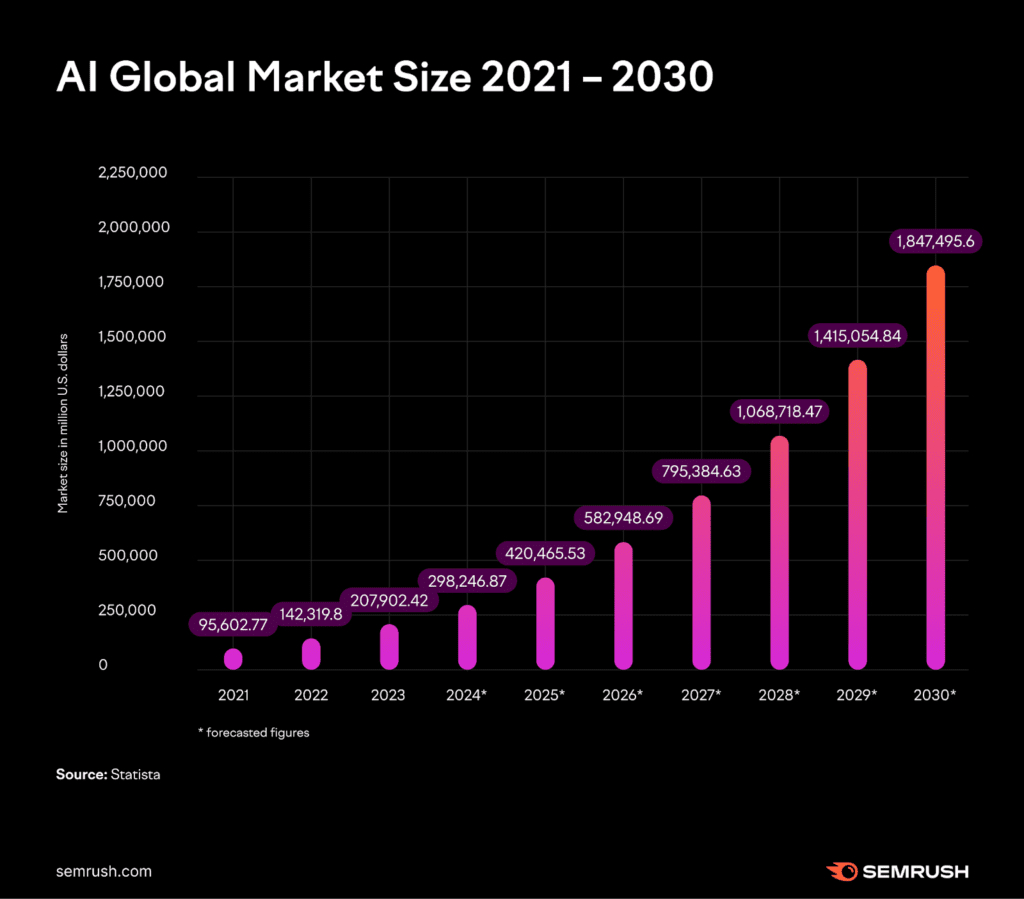Balancing Automation and Authenticity
As we move further into the future of AI in marketing, we must reshape how we approach tasks, output and content. Generative AI, in particular, is revolutionising content creation, offering unprecedented efficiency and personalisation. However, this rapid advancement brings challenges, especially in maintaining authenticity and trust.
In this article, we explore the future of AI in marketing, its implications, strategies to balance automation with human touch, and insights from industry experts.
The Rise of Generative AI in Content Creation
In recent years, generative AI in marketing has emerged as a transformative force in content creation. This technology leverages advanced machine learning algorithms to produce text, images, and videos, significantly streamlining the creative process for marketers. According to a comprehensive report by HubSpot, a staggering 85% of marketers acknowledge that generative AI has altered their content creation strategies. Moreover, 63% of these professionals anticipate that AI will be crucial in their content production by 2024 (HubSpot Blog).
Generative AI tools, such as OpenAI’s GPT-4, can generate various content types, from blog posts and social media updates to creative ad copy. These tools offer remarkable efficiency, reducing the time and effort required to produce high-quality content. Marketers who use these tools report improved content quality, enhanced efficiency, and a significant increase in output. Specifically, 85% of marketers have noted quality enhancements, 84% have experienced increased efficiency, and 82% have produced significantly more content using AI tools (HubSpot Blog) (WebFX).
This technological advancement enables marketers to tailor content more precisely to audience preferences. 77% of marketers highlight improved personalisation as a key benefit of AI-driven content creation (HubSpot Blog). The ability to quickly generate and iterate content based on real-time data and insights allows brands to stay relevant and engage their audiences more effectively.
However, while the efficiency and capabilities of generative AI in marketing are impressive, the challenge lies in maintaining the authenticity and trustworthiness of the content. Consumers today are increasingly discerning and wary of content that feels overly automated. To address this, marketers must find a balance, integrating AI tools as assistants rather than replacements for human creativity. By doing so, they can ensure that the content remains engaging, relatable, and authentic, thereby fostering stronger connections with their audiences.
“In my two decades in digital marketing, I’ve repeatedly seen technology transform our industry. AI in marketing is the latest tool in our arsenal, but we must use it to enhance, not replace the human touch. Authenticity and trust are built on personal connections and real experiences, something AI alone cannot replicate.” – Tom, Founder at BQC
As we look to the future, the role of generative AI in content creation will undoubtedly expand. However, its successful integration will depend on how well marketers can leverage its strengths while preserving the essential human elements that resonate with audiences. By striking this balance, brands can harness the full potential of AI to deliver compelling, personalised content that drives engagement and builds lasting relationships.
In 2023, the global AI market size was close to $208 billion. It is projected that by 2030, the market size will reach nearly $2 trillion (Statista, 2023)
The Importance of Trust and Transparency of AI in Marketing
Trust is a cornerstone of effective marketing. As AI in marketing becomes more prevalent, maintaining transparency about its use is essential. The Digital Marketing Institute emphasises the importance of the EEAT framework (Experience, Expertise, Authoritativeness, Trustworthiness) in SEO. This framework underscores the need for content that reflects real-world experience and expert knowledge, elements that AI alone cannot provide.
Google’s Search Quality Evaluator Guidelines have also more robustly incorporated the EEAT framework, with a new emphasis on ‘Experience’. This shift highlights that while AI can assist in content creation, human creators’ unique experiences and insights remain invaluable.
Strategies for Trustworthy AI Integration
As AI becomes increasingly integral to marketing, ensuring its trustworthy integration is paramount. Here are enhanced strategies to maintain authenticity, reliability, and transparency when using AI in content creation:
Human Oversight
AI-generated content can offer remarkable efficiency and creativity but must be tempered with human oversight. Ensuring that human experts review and edit all AI-generated content adds a crucial layer of authenticity and reliability. This oversight helps address potential biases or inaccuracies from AI outputs, ensuring the final content aligns with the brand’s voice and values. According to Gartner, human oversight in AI processes is essential for maintaining quality and trust.
Key Takeaway: Implement a robust review process where human experts fine-tune AI-generated content, adding unique insights and personal touches that resonate with audiences.
Transparency
Being transparent about using AI in content creation is essential to build and maintain trust. Disclosing when AI-assisted content allows audiences to appreciate the blend of technology and human expertise. This openness fosters a stronger connection with the audience and mitigates any potential scepticism. A report by the Digital Marketing
Institute emphasises the importance of transparency in maintaining consumer trust (WebFX).
Continuous Learning
AI tools must be continually updated with industry trends and consumer preferences to ensure the generated content remains relevant and accurate. This involves regular updates and training of AI models based on new data and feedback. Continuous learning improves the quality of AI outputs and ensures that the content stays aligned with evolving market dynamics. HubSpot’s research highlights the need for ongoing updates to keep AI tools effective and reliable (HubSpot Blog).
Feedback Loops
Incorporating feedback mechanisms is crucial for continuously improving AI performance. Marketers can refine AI algorithms and content strategies by actively collecting and analysing user responses and engagement metrics. This iterative process ensures that AI-generated content evolves in response to real-world interactions and feedback, enhancing its effectiveness and alignment with audience expectations. According to Coursera, leveraging feedback loops is a key strategy in optimising AI in marketing applications. (Coursera).
Key Takeaway: Establish robust feedback loops to gather user insights and engagement data, using this information to refine and improve AI-generated content continuously.
“Transparency about AI’s role in content creation is non-negotiable. Our audience values authenticity, and by being open about our use of AI in marketing, we can build stronger, more trustful relationships. It’s about enhancing the human element, not hiding behind technology.” – Tom, Founder at BQC.
Integrating AI in marketing strategies offers immense potential for efficiency and personalisation. However, maintaining authenticity and trust requires careful implementation of these strategies. Marketers can leverage AI’s strengths while preserving the essential human touch that resonates with audiences by ensuring human oversight, practising transparency, committing to continuous learning, and establishing feedback loops.

smartinsights.com
Practical Applications and Future Directions
This visual shows the wide array of applications for Machine Learning and AI in marketing across the RACE customer lifecycle, all of which can be put in place today. You can learn more on Smart Insights.
Enhancing Customer Interactions with AI
AI’s potential in marketing extends far beyond content creation. Advanced AI technologies, such as chatbots and virtual assistants powered by natural language processing (NLP), are revolutionising customer interactions. These tools can handle many customer queries, providing high-quality responses quickly and efficiently. This capability enhances customer satisfaction and frees human customer service teams to focus on more complex issues (Coursera).
For instance, AI-driven chatbots can assist customers 24/7, offering instant support and personalised recommendations based on previous interactions. This improves the customer experience and helps businesses manage large volumes of inquiries without overwhelming their human staff.
Personalisation at Scale
Personalisation is a critical component of modern marketing, and AI makes it more achievable than ever. Machine learning algorithms analyse vast customer data to deliver tailored experiences, from product recommendations to personalised content delivery. According to HubSpot, 96% of marketers believe personalisation leads to repeat business, and 94% say it increases sales (Coursera) (HubSpot Blog).
AI in marketing enables businesses to create highly personalised marketing campaigns that resonate with individual customers. For example, e-commerce platforms can use AI to recommend products based on a customer’s browsing history and purchase behaviour, significantly enhancing the shopping experience and driving conversions.
Key Takeaway: Leverage AI-driven personalisation to create tailored marketing campaigns that resonate with customers, increasing loyalty and sales.
The Role of Video and Visual Search
Visual search and video content are becoming increasingly important in digital marketing strategies. Tools like Google Lens and Pinterest Lens allow users to search using images, opening new avenues for consumer interaction. Visual search technology enables customers to find products by simply taking photos, which can be particularly useful in retail and e-commerce sectors (Exploding Topics) (Social Media Dashboard).
Moreover, the popularity of short-form video content on platforms like TikTok and Instagram Reels highlights the need for marketers to adapt their strategies to include engaging visual content. Short, impactful videos can capture attention quickly and are highly shareable, making them ideal for reaching a broader audience.
Key Takeaway: Integrate visual search capabilities and short-form video content into your marketing strategy to engage consumers innovatively and drive higher interaction rates.
“AI’s role in enhancing customer interactions, personalising experiences, and leveraging visual content is undeniable. As marketers, it’s our job to harness these technologies to create more meaningful and engaging customer experiences.” – Tom, Founder at BQC.
The practical applications of AI in marketing are vast and varied. From enhancing customer interactions with chatbots to delivering personalised experiences and leveraging the power of visual search and video content, AI offers numerous opportunities to improve engagement and drive business success. Marketers can create compelling strategies that resonate with their audiences by staying ahead of these trends and integrating AI thoughtfully.
Wrapped: The Future of AI in Marketing
Integrating AI in marketing presents unparalleled opportunities, from streamlining content creation to delivering highly personalised consumer experiences. However, as we embrace these advancements, it is crucial to balance automation with authenticity. AI in marketing should be viewed as a powerful tool that augments human creativity, not a replacement for it. Marketers can harness AI’s potential while preserving the human touch that resonates with audiences by ensuring transparency, maintaining human oversight, and leveraging continuous learning and feedback.
The future of marketing lies in harmonising AI’s efficiencies with the irreplaceable value of genuine human connection. This balance will allow brands to create more compelling, trustworthy, and engaging customer experiences.
To stay ahead tomorrow, marketers must remain adaptable. They must continuously update their strategies to incorporate the latest technological advancements while upholding the principles of authenticity and trust.
By focusing on these strategies and insights, you can confidently embrace AI in marketing to increase your efforts, driving innovation and growth while maintaining the essential human touch.
How are you integrating AI in marketing strategies?
What challenges and successes have you experienced in balancing automation with authenticity?
Share your thoughts and experiences with us in the comments below. Let’s discuss how we can harness AI’s potential to create more meaningful, engaging, and trustworthy marketing experiences.





